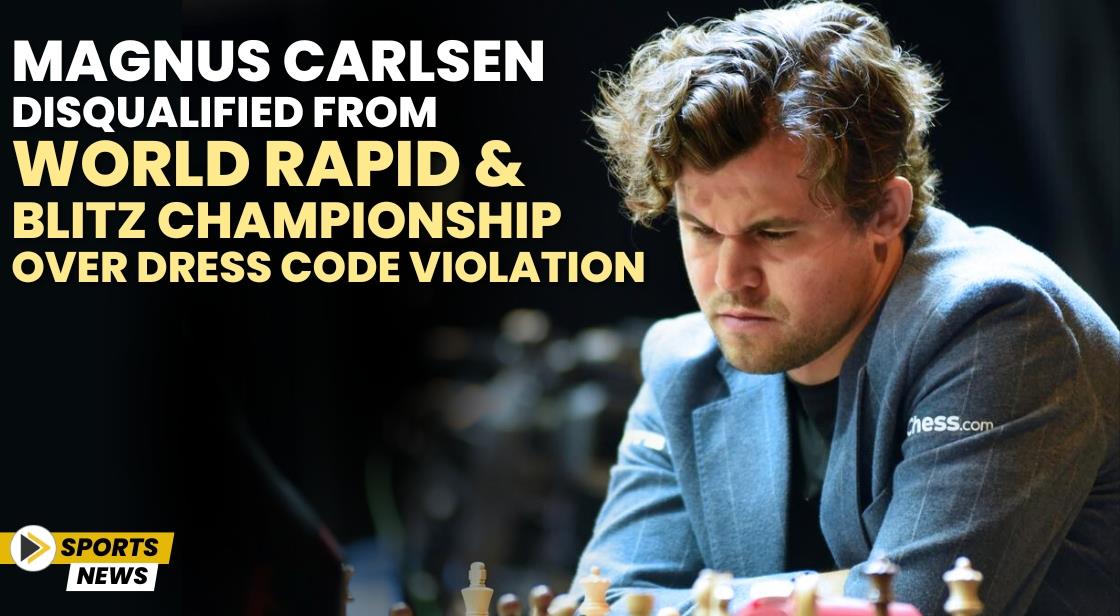Magnus Carlsen Disqualified from World Rapid and Blitz Championship Over Dress Code Violation

News Synopsis
Five-time world champion Magnus Carlsen faced disqualification from the World Rapid and Blitz Chess Championship for failing to comply with FIDE’s dress code. The Norwegian chess legend was fined USD 200 for appearing in jeans, explicitly prohibited under tournament regulations. When asked to change his attire immediately, Carlsen refused, resulting in his disqualification from Round 9 of the Rapid Championship.
Defending Champion's Resistance to Immediate Compliance
As the defending champion, Carlsen had agreed to follow the dress code from the following day. However, his unwillingness to make an immediate change led to his removal from the tournament. Chief arbiter Alex Holowczak made the decision based on FIDE’s strict rules, which are applicable to all players without exception.
FIDE’s Emphasis on Dress Code Professionalism
In a statement, FIDE, the global governing body of chess, highlighted the importance of dress code regulations in maintaining professionalism during events. According to FIDE, these rules are established by the FIDE Athletes Commission, composed of professional players and experts, and are communicated well in advance to all participants.
FIDE's Justification of the Decision
FIDE clarified that the dress code breach was handled impartially, as per long-standing regulations. They pointed out that players' accommodations were arranged within a short walking distance from the venue to make adherence to rules convenient. Carlsen’s refusal to comply with the regulations on the spot led to the enforcement of a USD 200 fine and subsequent disqualification.
Similar Incident with Ian Nepomniachtchi
Russian Grandmaster Ian Nepomniachtchi had earlier committed a similar dress code violation during the championship. Unlike Carlsen, Nepomniachtchi complied with the request to change his attire, allowing him to continue participating in the tournament.
Carlsen's Frustration with FIDE’s Policies
Magnus Carlsen expressed his dissatisfaction with FIDE’s dress code policies following the incident. Speaking to Norwegian broadcasting channel NRK, Carlsen admitted feeling upset and declared that he would not participate in the Blitz section of the championship.
"I am pretty tired of FIDE, so I want no more of this. I don’t want anything to do with them. Maybe it’s a stupid principle, but I don’t think it’s fun anymore," Carlsen remarked.
Carlsen's Perspective on the Incident
Carlsen acknowledged that he was willing to change his attire from the next day but was unwilling to do so immediately. He criticized FIDE for their inflexibility, stating, "I don’t want to bother changing now, but I can do it tomorrow. They didn’t want to compromise, and I didn’t want to either. That’s how it goes."
Impact of the Incident on Carlsen’s Participation
The controversy has overshadowed Carlsen’s performance in the championship. As one of the greatest players in the history of chess, his absence from the Blitz section could influence the competition’s dynamics. The incident also raises questions about the rigidity of FIDE’s policies and their impact on player participation.
The Debate Over Dress Code Enforcement
The strict enforcement of dress code rules has sparked a debate within the chess community. While professionalism is crucial in maintaining the game’s prestige, some argue that flexibility could prevent incidents like Carlsen’s disqualification.
Conclusion
The disqualification of Magnus Carlsen from the World Rapid and Blitz Chess Championship underscores the importance of adhering to tournament regulations, even for the greatest players in the game. While FIDE’s strict enforcement of the dress code aims to maintain professionalism, the incident highlights the potential for conflict when rules are perceived as inflexible.
Carlsen’s refusal to change his attire immediately and his subsequent decision to skip the Blitz section reflect his growing frustration with FIDE’s policies. This episode serves as a reminder of the delicate balance between upholding standards and accommodating players’ concerns to preserve the spirit of competition.
As the chess community debates the necessity and implementation of such regulations, the incident also raises broader questions about fostering mutual respect and understanding between governing bodies and players. Moving forward, the focus should remain on ensuring fairness while keeping the game engaging and inclusive for all participants.
You May Like









